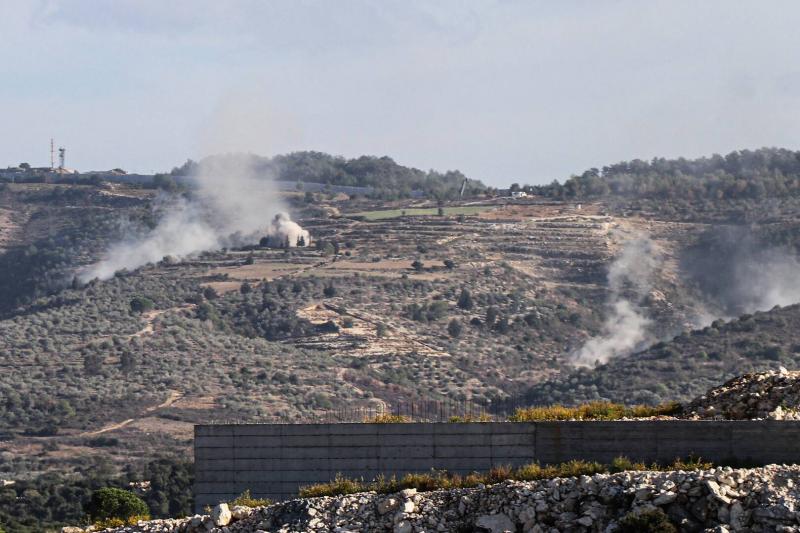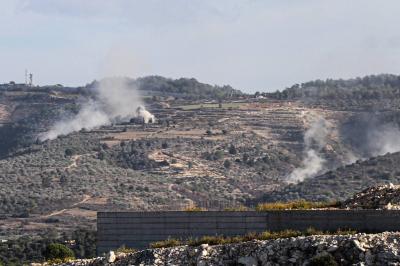The skirmishes between Israel and Lebanese Hezbollah have become a source of concern for the United States, which does not wish to see an escalation of conflict on other fronts in the Middle East at this time. The worries of the U.S. administration, according to the Washington Post, have emerged after Israel made it clear that it views the routine exchange of fire between its forces and Hezbollah along the border as intolerable, and that a large military operation in Lebanon could soon be launched. Notably, Israeli leaders have made statements such as Defense Minister Yoav Galant’s on Friday, indicating, "We prefer a negotiated diplomatic settlement, but we are nearing the point where the hourglass will turn," as per the report.
Israeli army spokesman Daniel Hagari said on Saturday evening, referring to the threat of attacks from Lebanon, that the Israeli military remains "extremely well-prepared in the north, in defense and offense," according to the Wall Street Journal. The threats of a broader conflict in the region increased on Saturday when Hezbollah fired around 40 rockets at Israel in retaliation for the assassination of prominent Hamas leader Saleh al-Arouri and six others in an airstrike in the suburbs of the Lebanese capital, Beirut, days before, coinciding with the arrival of a senior diplomat from the Biden administration to the region to diffuse the escalating Middle East crisis resulting from the war in Gaza, according to the Wall Street Journal.
In recent weeks, the regular gunfire exchanges between Israel and Hezbollah along the border have become more aggressive, prompting specific criticism from Washington, U.S. officials told the Washington Post. In another sign of the escalation in fighting, Israeli airstrikes penetrated deep into Lebanon on Saturday, according to Lebanese authorities. The rockets struck the town of Kouthriyat al-Siyad, located over 30 miles north of the Israeli border, as reported by the Wall Street Journal citing Lebanon's national news agency. According to U.S. intelligence data reviewed by the newspaper, the Israeli military has targeted U.S.-funded and trained Lebanese armed forces locations more than 34 times since October 7, according to officials familiar with the matter.
U.S. officials are concerned, as they told the newspaper, that Israeli Prime Minister Benjamin Netanyahu might view the expansion of combat from Gaza to Lebanon as key to his political survival amid internal criticism of his government's failure to prevent the Hamas attack on October 7, which resulted in approximately 1,200 deaths and the hostage-taking of about 240 individuals, according to Israeli authorities. The newspaper reported that the U.S. administration has warned Israel in private discussions against a significant escalation in Lebanon.
The Washington Post detailed, citing over ten U.S. administration officials and diplomats, that President Joe Biden has sent senior aides to the Middle East with the crucial goal of preventing a full-scale war between Israel and Hezbollah.
The dilemma, according to the newspaper, is that if Israel indeed launches a war against Hezbollah, it would be hard for the Israeli military to succeed as its assets and military resources would be extremely stretched due to its engagement in the Gaza war, according to a new secret assessment from the U.S. Defense Intelligence Agency (DIA), according to two informed individuals. A DIA spokesman did not provide any comment to the newspaper, as reported.
The newspaper noted that Hezbollah, a long-time adversary of the United States with well-trained fighters and tens of thousands of rockets and missiles, wants to avoid a major escalation. U.S. officials stated that the group's leader, Hassan Nasrallah, seeks to steer clear of entering a full-scale war. In a speech on Friday, Nasrallah vowed to respond to "Israeli aggression," while implying he might be open to negotiations regarding border demarcation with Israel.
U.S. Secretary of State Antony Blinken is scheduled to arrive in Israel on Monday, where he will discuss specific steps "to prevent escalation," according to his spokesperson Matt Miller before boarding the flight to the Middle East. Miller said, "It is in no one's interest - neither Israel's nor the region's nor the world's - for this conflict to spread beyond Gaza." However, this viewpoint is not uniformly embraced within the Israeli government.
U.S. officials told the newspaper that since the Hamas attack on October 7, Israeli officials have discussed launching a preemptive attack against Hezbollah. This possibility has faced ongoing U.S. opposition due to the risk of drawing Iran, which supports Hezbollah, into the conflict - a scenario that could compel the U.S. to respond militarily on behalf of Israel.
American officials are concerned, according to the newspaper, that a broad conflict between Israel and Lebanon could result in more bloodshed compared to what was witnessed in the Israel-Lebanon War of 2006, due to Hezbollah's long-range and precise weapons arsenal, which has significantly increased. According to some experts consulted by the newspaper, the number of casualties in Lebanon could range from 300,000 to 500,000, necessitating a wide-scale evacuation of all northern Israel. Officials are also apprehensive that Hezbollah could strike deeper into Israel than before, targeting sensitive sites such as petrochemical plants and nuclear reactors, with Iran potentially activating militias across the region.
Another concern for Washington, according to the Wall Street Journal, is that the conflict in Gaza has increased the risks facing U.S. military forces in the region, which have come under increasing attacks from Iran-backed militias in Iraq and Syria. Since mid-October, there have been at least 115 attacks on U.S. and coalition forces in Iraq and Syria, according to U.S. officials.




